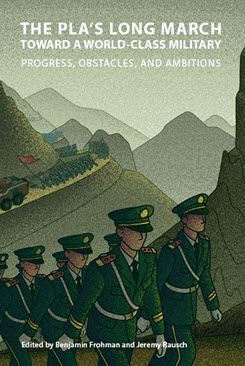Book from the People's Liberation Army Conference
System by Design: The Evolution of China’s Military-Civil Fusion Strategy
This chapter examines the evolution of China’s military-civil fusion (MCF) strategy and its subordination into the broader concept of the national strategic system and capabilities (NSSC).
Executive Summary
MAIN ARGUMENT
Since around 2017, there has been a shift in Chinese Communist Party (CCP) discourse from the language of MCF to the language of an integrated NSSC. The NSSC is a concept in Chinese official discourse for mobilizing all state resources to achieve national goals and build comprehensive power. It includes sub-strategies like development and MCF and focuses on key areas such as cyber, space, and maritime. The CCP has transitioned from discussing the party’s national-level strategy to building the system the MCF strategy was designed to perfect. The elevation of the NSSC concept in official Chinese policy discourse represents the intensification of CCP efforts to integrate all available state resources to pursue national goals and increase China’s comprehensive national power. The elevation of the NSSC concept in party doctrine affirms the successful implementation of the MCF strategy and is reflected in organizational developments and major achievements advancing the party’s goal of building a world-class military and positioning China as a global leader.
POLICY IMPLICATIONS
- Although China’s MCF strategy has now evolved into the NSSC, it remains a significant threat to U.S. and allied commercial and national security interests. If policymakers mistake rhetorical shifts for a decrease in the strategy’s importance, they will be unprepared to contend with fundamental asymmetries in the U.S.-China rivalry.
- Based on metrics that are crucial for U.S. interests—namely, maintaining leadership in vital technologies and prevailing in potential conflicts—the party is building an advantage through its pursuit of “deep fusion,” which refers to the party’s goal of promoting deep development of MCF in the defense industry.
- If U.S. policymakers wish to mount a robust defense against MCF, a re-evaluation of current policies will be required. This includes reassessing research security, technology collaboration frameworks, export controls, and investment-screening programs.
Liza Tobin is Managing Director at Garnaut Global, a geopolitical risk advisory firm.
Addis Goldman is an independent researcher focused primarily on U.S.-China economic and technology security issues.
Katherine Kurata is a professional staff member on the U.S. House Select Committee on Strategic Competition between the United States and the Chinese Communist Party.



 The PLA's Long March toward World-Class Status
The PLA's Long March toward World-Class Status
